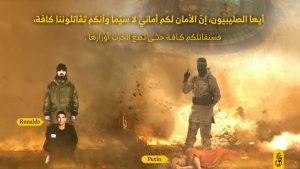MESOPOTAMIA NEWS INTEL SPECIAL : ISIS CONTRA WORLD CUP IN RUSSIA & PUTIN
Gilad Shiloach analyzes the social media campaign that threatens the 2018 World Cup competition to be held in Russia. – 21 May 2018 – : THE MOSHE DAYAN CENTER
Supporters of the Islamic State have launched a massive social media campaign threatening to attack the 2018 FIFA World Cup in Russia. The tournament begins on June 14 and will take place at 12 venues in 11 cities across the country. The social media campaign is led by pro-IS channels on Telegram and deploys images and texts in English, Russian, and Arabic. Although the campaign was created by the terror group’s supporters and not by the official IS propaganda apparatus, it has received widespread, often hysterical attention in the Western media. The campaign, however, could also be seen as a desperate attempt by the IS to regain international attention by threatening one of the world’s most popular sporting events.
The current campaign allows the pro-IS channels to “kill two birds with one stone.” First, it is targeting Russia, a longtime enemy of the jihadi group that has already suffered IS attacks on its soil in recent years, in addition to the October 2015 bombing of the Russian Metrojet Flight 9268 over northern Sinai that killed 224 people. Posters circulated on pro-IS channels showed a suicide bomber outside Moscow’s Luzhniki Stadium, Russia’s national stadium and site of both the opening and final matches of the tournament. Other images showed the Kremlin set on fire and Russian President Vladimir Putin in an orange jumpsuit with English, Arabic and Russia titles announcing, “We will turn your night into fire.”
Another part of the campaign is targeting a more global audience. Doctored images show world-renowned football stars Cristiano Ronaldo and Lionel Messi beheaded; another poster features FIFA President Gianni Infantino dressed as a prisoner. These images included titles that read, “Russia, very soon, a single attack can hit citizens from many countries of the Crusader coalition.”
Russia and other countries in the West find it difficult to ignore or dismiss the current threats from the IS given the terrorist group’s proven track record of carrying out major, sophisticated terror attacks around the world, whether the IS directed and coordinated operations or “lone wolf” attacks inspired by the group’s propaganda. Russian jihadis, specifically Chechen fighters returning from former IS stronghold in Syria and Iraq, are another source of concern for Moscow. Adding to the severity of the threat, June 14 is also the last day of Ramadan, a month IS has referred to as “the holy month of jihad.” The month of Ramadan has witnessed a stunning rise in attacks relative to other months in recent years, an increase attributed to IS attempts to transform the month of prayer and atonement into one of bloodshed and violence.
The World Cup competition in Russia offers an excellent opportunity for the group as well as its supporters to “return to the game” and put the jihadi organization back at the top of world headlines. Although it is led by IS supporters, and not by the official IS media apparatus, this social media campaign may reflect the jihadi organization’s newfound determination to carry out new and significant attacks across the globe as its territory dwindles in the Middle East.
www.mesop.de
